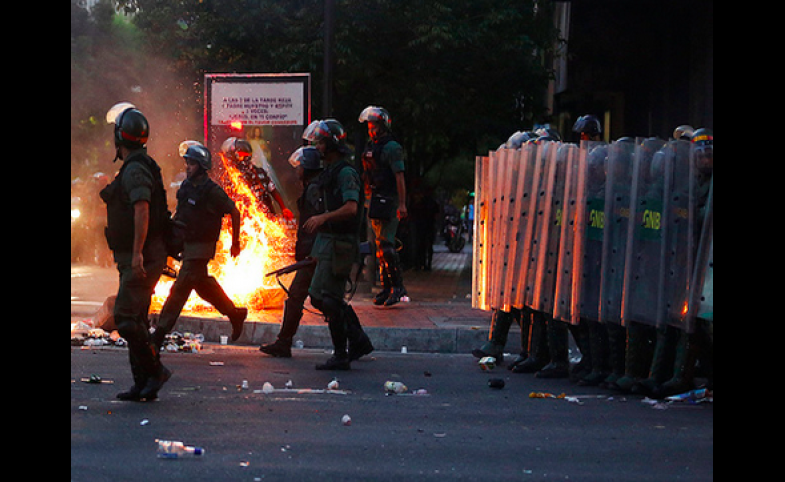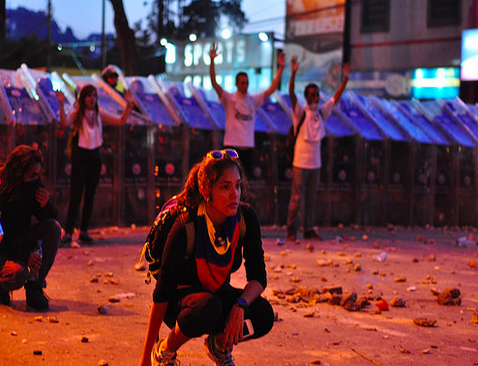Note from the CPD Blog Manager: This piece is a revised version of a Foreword published in International Broadcasting and its Contested Role in Australian Statecraft: Middle Power, Smart Power (Anthem Press, London & New...
KEEP READINGThe CPD Blog is intended to stimulate dialog among scholars and practitioners from around the world in the public diplomacy sphere. The opinions represented here are the authors' own and do not necessarily reflect CPD's views. For blogger guidelines, click here.

Are We Witnessing the Demise of Venezuela’s Soft Power?
As much of the world’s media continues to focus on the politics of the 2014 Sochi Winter Olympics and the continued violent protests in the Ukraine, another country closer to home threatens to descend into civil war.
Street demonstrations throughout Venezuela, now entering their second week, have turned a country already suffering from high rates of violent crime and murders into a battleground. Supporters of opposition leader Leopoldo Lopez have taken to the streets in Caracas and elsewhere, demanding solutions for Venezuela’s economic nosedive and crime epidemic. The Venezuelan government has responded with a heavy crackdown against protesters, arresting opposition leaders, including Lopez, using paramilitary groups to attack protesters, and firing tear gas and live ammunition at anyone appearing to be against the government.
Maduro’s response to the protests has been equally detrimental. Last week, he blamed the U.S. for meddling and causing the uprisings. He then expelled several American diplomats from the country, despite there being no evidence of U.S. interference. His state-run news agency, Telesur, also accused Venezuela’s neighbor Colombia and Colombian President Juan Manuel Santos of inciting violence and sabotaging the country. In his public appearances, the president has appeared confused and erratic, the exact opposite of how his successor, Hugo Chavez, appeared when making addresses to the Venezuelan people and global audiences.
In the last year, Maduro has managed to destroy nearly all of the goodwill that Chavez had built up in the region, particularly in the “alternative to the hegemonic U.S.” vein, despite having numerous opportunities (the NSA spying scandal, Ecuador’s Correa flight over Europe) that his successor could only dream of having. Under former President Hugo Chavez, Venezuela’s public diplomacy strategy was decidedly aggressive yet largely peaceful, and for the most part, successful. Chavez became President of Venezuela in 1999 after decades of discontent over political corruption and poverty and used various international and domestic platforms to denounce the United States and to promote Venezuelan policies. Julia Sweig, in her analysis for the Council on Foreign Relations, wrote that Hugo Chavez “once remarked that he saw himself as a transitional figure in Venezuelan history.”
Chavez’s overseas development (ODA) efforts in Cuba, Bolivia, Ecuador, and much of Central America and the Caribbean threatened to not only provide a counterbalance to U.S. hegemony in the Western Hemisphere, but to do so without violence and with surprising poise. In the eyes of many, Chavez’s Venezuela was winning the public diplomacy battle against the United States with his initiatives like the anti-FTAA trade agreement Bolivarian Alternative for the Americas (ALBA), the TV network Telesur, and his various petro-aid schemes Petrocaribe, Petroandina, and Petrosur.

Flickr, Creative Commons, AndresAzp
But fast forward to today and Chavez’s successor, Nicolas Maduro, seems to be missing much of the public diplomacy plot. His economic and trade policies are considered largely to be failures, with inflation at astronomically high levels as Venezuelans are forced to endure crippling shortages for basic foodstuffs and consumer goods. Following last April’s election, where Maduro narrowly beat opposition leader Henrique Capriles Radonski, the Venezuelan government has continued to engage in a poor public diplomacy and communications strategy that has further weakened the Bolivarian republic. As noted by William Dobson in his recent article for Slate.com, the key difference between the Venezuela of Chavez and the Venezuela of Maduro is that “for all of the combative rhetoric and venom spewed by Hugo Chavez, the Comandante always kept a lid on widespread repression.” Despite often having his anti-American and anti-opposition rhetoric often cross over into the realm of insanity and conjecture, Chavez knew that his public diplomacy strategy would be for nought if he engaged in a visible, lengthy, brutal crackdown.
It is evident that Maduro has not learned this lesson and has struggled to match his successor’s confidence and bravado, all while engaging in the self-defeating act of ordering brutal crackdowns on peaceful demonstrators. Opposition groups like Popular Will Party, who were largely marginalized and weakened under Chavismo, have become revitalized and emboldened.
Maduro’s government has seemingly failed to understand that the public diplomacy capital built up through aid diplomacy and careful communications strategies by Hugo Chavez has been destroyed in one fail swoop by sloppy tactics and violent crackdowns by the police and military.
Visit CPD's Online Library
Explore CPD's vast online database featuring the latest books, articles, speeches and information on international organizations dedicated to public diplomacy.
POPULAR ARTICLES
-
January 29
-
January 20
-
January 28
-
February 6
-
January 8
Join the Conversation
Interested in contributing to the CPD Blog? We welcome your posts. Read our guidelines and find out how you can submit blogs and photo essays >.













